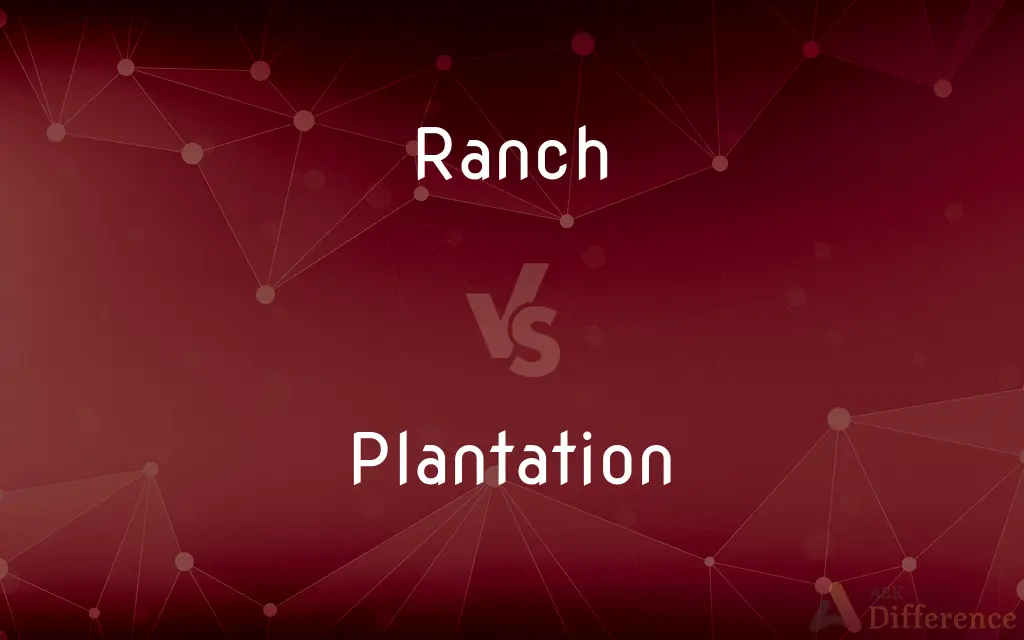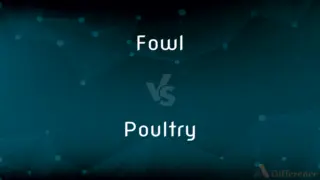Ranch vs. Plantation — What's the Difference?
By Tayyaba Rehman & Maham Liaqat — Updated on March 29, 2024
A ranch primarily focuses on livestock and extensive land use, whereas a plantation is centered around crop farming and often has historical connotations of labor exploitation.

Difference Between Ranch and Plantation
Table of Contents
ADVERTISEMENT
Key Differences
Ranching involves the extensive rearing of animals such as cattle, sheep, and horses on large tracts of land, emphasizing animal husbandry practices. On the other hand, plantations are large-scale farms that focus on the mass production of crops like cotton, sugar, and tobacco, often relying on a monoculture approach.
Ranches are typically found in regions with vast open spaces suitable for grazing, such as the American West and parts of Australia, where the emphasis is on land and animal management. Plantations, however, are usually located in areas with climates conducive to the growth of specific crops, such as the southern United States, the Caribbean, and parts of Asia and Africa.
The business model of a ranch revolves around the breeding, raising, and selling of livestock and their by-products. Whereas plantations concentrate on the cultivation, harvesting, and selling of crop yields, often involving more intensive labor and cultivation techniques.
Ranching operations can be family-owned or corporate, with a focus on sustainable land use and animal welfare. In contrast, historical plantations often utilized slave or indentured labor, with modern operations frequently criticized for labor practices and environmental impacts.
Ranching requires knowledge of animal husbandry, veterinary care, and sustainable grazing management. Plantation farming demands expertise in crop cultivation, pest control, and harvesting technologies, reflecting the differing skill sets needed for success in each.
ADVERTISEMENT
Comparison Chart
Primary Focus
Livestock rearing and management
Crop cultivation
Location
Open, arid or semi-arid regions
Regions with climates suitable for specific crops
Business Model
Selling of livestock and by-products
Selling of harvested crops
Historical Labor Use
Varied, often family-run or hired workers
Often involved slave or indentured labor
Required Expertise
Animal husbandry and sustainable land management
Crop cultivation, pest control, harvesting
Compare with Definitions
Ranch
An operation focusing on livestock rather than crop production.
His family has owned the cattle ranch for generations.
Plantation
A large farm dedicated to the cultivation of a single crop.
The sugar plantation has been in operation for over a century.
Ranch
Characterized by extensive land use for grazing.
They manage the ranch to support sustainable grazing practices.
Plantation
Known for its historical use of labor exploitation.
The plantation’s history is marred by its past use of slave labor.
Ranch
A large farm for raising horses, beef cattle, or sheep.
The ranch spans thousands of acres across the valley.
Plantation
Often associated with crops like tobacco, cotton, and sugar.
The family-owned plantation specializes in organic cotton.
Ranch
Can be involved in various types of livestock.
Besides cattle, the ranch also raises alpacas.
Plantation
Requires intensive labor and cultivation.
Workers on the plantation are busy during the harvest season.
Ranch
Often located in regions with large open spaces.
The sprawling ranch is a hallmark of the Western landscape.
Plantation
Located in climates conducive to specific crops.
The tropical climate makes the region ideal for the banana plantation.
Ranch
A ranch (from Spanish: rancho) is an area of land, including various structures, given primarily to ranching, the practice of raising grazing livestock such as cattle and sheep. It is a subtype of a farm.
Plantation
A plantation is a large-scale estate, generally centered on a plantation house, meant for farming that specializes in cash crops. The crops that are grown include cotton, coffee, tea, cocoa, sugar cane, opium, sisal, oil seeds, oil palms, fruits, rubber trees and forest trees.
Ranch
An extensive farm, especially in the western United States, on which large herds of cattle, sheep, or horses are raised.
Plantation
An estate on which crops such as coffee, sugar, and tobacco are grown.
Ranch
A large farm on which a particular crop or kind of animal is raised
A mink ranch.
Plantation
Colonization or settlement of emigrants, especially of English and then Scottish families in Ireland in the 16th–17th centuries under government sponsorship
The Plantation of Ulster
Ranch
The building on a ranch occupied by its operator; a ranch house.
Plantation
An area under cultivation.
Ranch
A one-story house, usually having a low-pitched roof; a ranch house.
Plantation
A group of cultivated trees or plants.
Ranch
To manage or work on a ranch.
Plantation
A large estate or farm on which crops are raised, often by resident workers.
Ranch
A large plot of land used for raising cattle, sheep or other livestock.
Plantation
A newly established settlement; a colony.
Ranch
A small farm that cultivates vegetables and/or livestock, especially one in the Southwestern United States.
Plantation
A large farm; estate or area of land designated for agricultural growth. Often includes housing for the owner and workers.
Ranch
A house or property on a plot of ranch land.
Plantation
An area where trees are planted, either for commercial purposes, or to adorn an estate.
Ranch
(uncountable) Ranch dressing.
Plantation
(historical) The importation of large numbers of workers and soldiers to displace the local population, such as in medieval Ireland and in the Americas; colonization.
Ranch
To operate a ranch; to engage in ranching.
Formally the widow still ranches, but in fact she leaves all ranching to the foreman.
Plantation
(historical) A colony established thus.
Rhode Island and Providence Plantations (former official name of Rhode Island, United States)
Ranch
To work on a ranch.
Bill had ranched only five years when his dad made him foreman.
Plantation
The act or practice of planting, or setting in the earth for growth.
Ranch
To wrench; to tear; to sprain; to injure by violent straining or contortion.
Plantation
The place planted; land brought under cultivation; a piece of ground planted with trees or useful plants; esp., in the United States and West Indies, a large estate appropriated to the production of the more important crops, and cultivated by laborers who live on the estate; as, a cotton plantation; a coffee plantation.
Ranch
A tract of land used for grazing and the rearing of horses, cattle, or sheep. See Rancho, 2.
Plantation
An original settlement in a new country; a colony.
While these plantations were forming in Connecticut.
Ranch
Farm consisting of a large tract of land along with facilities needed to raise livestock (especially cattle)
Plantation
An estate where cash crops are grown on a large scale (especially in tropical areas)
Ranch
Manage or run a ranch;
Her husband is ranching in Arizona
Plantation
A newly established colony (especially in the colonization of North America);
The practice of sending convicted criminals to serve on the Plantations was common in the 17th century
Plantation
Garden consisting of a small cultivated wood without undergrowth
Common Curiosities
What is the main difference between a ranch and a plantation?
A ranch focuses on livestock, while a plantation focuses on crop production.
What types of livestock are typically found on a ranch?
Cattle, sheep, horses, and sometimes exotic animals like alpacas.
Can a ranch also grow crops?
Yes, some ranches may grow crops, primarily for feeding livestock.
Do modern plantations still use forced labor?
While historical plantations often used slave labor, modern practices vary, with some facing criticism for labor conditions.
Are plantations only found in the southern United States?
No, plantations are found worldwide, in any region suitable for their specific crops.
How do ranchers manage their land sustainably?
Through practices like rotational grazing and land conservation efforts.
What makes a plantation successful?
Factors include climate, soil quality, labor management, and effective pest control.
Are there environmental concerns associated with plantations?
Yes, concerns include biodiversity loss, pesticide use, and deforestation.
What skills are needed to run a ranch?
Skills in animal husbandry, veterinary care, and land management are crucial.
Do ranches contribute to local ecosystems?
Yes, when managed sustainably, ranches can support wildlife and healthy ecosystems.
How has the role of plantations in history impacted their perception today?
Historical labor abuses and exploitation affect contemporary views and calls for ethical practices.
Can both ranches and plantations be family-owned?
Yes, both can be family-owned, though they vary in scale and operation.
How do plantations affect the local environment?
They can impact negatively if not managed responsibly, affecting soil and local biodiversity.
What skills are important for managing a plantation?
Expertise in crop cultivation, pest management, and labor coordination is key.
Is it more profitable to operate a ranch or a plantation?
Profitability varies widely depending on factors like location, market demand, and management efficiency.
Share Your Discovery

Previous Comparison
Battlecruiser vs. Battleship
Next Comparison
Fowl vs. PoultryAuthor Spotlight
Written by
Tayyaba RehmanTayyaba Rehman is a distinguished writer, currently serving as a primary contributor to askdifference.com. As a researcher in semantics and etymology, Tayyaba's passion for the complexity of languages and their distinctions has found a perfect home on the platform. Tayyaba delves into the intricacies of language, distinguishing between commonly confused words and phrases, thereby providing clarity for readers worldwide.
Co-written by
Maham Liaqat













































